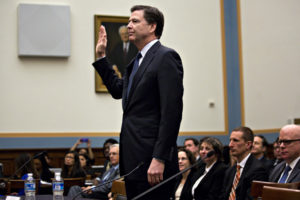Special to WorldTribune.com
For almost 150 years, the United States avoided having a national police force.
The Founders, for the most, had eschewed the whole issue when under pressure from Thomas Jefferson and his Virginia constitutions adopted that colony’s Bill of Rights as the first amendments to the federal constitution. The Virginia code’s tenth measure was to reserve all other rights and prerogatives not specifically named as federal functions to the individual states and their electorates.
Finally toward the end of the 19th century, a number of scandals – one involving the state government of Oregon – forced President Theodore Roosevelt, acting on the 1887 statutes regulating interstate commerce, to set up an investigative service. In theory, it reported to the attorney-general – who contrary to current misinterpretations of constitutional law is a political office, a member of the president’s executive council [cabinet], and not an independent, judicial organization.

Gen. Charles Joseph Bonapart, a collateral Baltimore descendant of the Little Corporal, created it on Roosevelt’s orders after Congress had denied him the authority to incorporate other federal policing activities — for fear of creating a secret police.
The FBI’s first serious activity was pursuit of the 1910 Mann act against involuntary prostitution. It took on new life with enforcement from 1932 of the ill-starred alcohol prohibition act, when its name was officially changed to the Bureau of Federal Investigation.
It was under J. Edgar Hoover, a uniquely endowed and politically astute veteran of the earlier agencies, who directed the FBI through an incredible career from 1924 to 1972. Hoover, for the most part avoiding party politics, gave the FBI its legendary reputation in pursuit of the big city criminal syndicates of the 1930s. And with the advent of World War II, the Agency took on a new role investigating terrorism after 9/11 and the Patriot Act.
Today the FBI’s mandate derives from Title 28 of the United States Code, Section 533, which authorizes the Attorney General to “appoint officials to detect and prosecute crimes against the United States.”
But it is other federal statutes which give the FBI responsibility to investigate specific types of criminal activity. By giving the director a ten-year sinecure, unlike any other federal appointee, an effort has continued to make it an independent agency, even if quartered in the executive under an elected president and his appointive attorney-general.
James Brien Comey, Jr. was sworn in as FBI director on Sept. 4, 2013 for a full ten-year term on the basis of a distinguished career as a prosecuting attorney. In several instances, he had distinguished himself by prosecuting former political colleagues. And many long-term observers of the Agency hoped for another extended tenure by a politically astute professional director.
Comey’s test has come with the politically explosive issue of the transgressions of Hillary Clinton, firstly through her use of personal e-mails for whatever proprietary reasons.
The even larger issue of the Clintons’ use – probably with the complicity of her husband, former President Bill Clinton — of a multi-billion foundation awaits in the wings.
Dozens of public officials – one of the latest and most well known, of course, Gen. David Howell Petraeus – have been convicted, ushered out of office and served prison sentences for just such violations of security.
Mrs. Clinton, as revealed in the e-mails reluctantly turned over to investigators by her office and the State Dept, purposely chose to remove this traffic from its security restrictions.
Whether, indeed, foreign intelligence agencies hacked into them remains obscure, but common sense tells us that any subject matter reaching the eyes of a secretary of state, makes them of high security value. Whether or not they were formally labeled as “classified” is largely irrelevant.
Comey has acknowledged all this in his statement announcing there will be no prosecution of Hillary Clinton. FurtherAmore, to our consternation, he has acknowledged that another person in a similar situation might well be prosecuted for the same infringement of security.
“To be clear, this is not to suggest that in similar circumstances, a person who engaged in this activity would face no consequences, Comey announced’ “To the contrary, those individuals are often subject to security or administrative sanctions. But that is not what we are deciding now.”
Yet, Comey offers no explanation for his decision. It is not untoward, then, that the general public must now conclude that it is Hillary Clinton’s prominence, her candidacy for the presidency and her denials of earlier admissions of malfeasance, which have led to this “decision”
This is a very sad day for Comey’s reputation, for the FBI and for the attempts to uphold the morality of American politics.
Sol W. Sanders, ([email protected]), is a contributing editor for WorldTribune.com and Geostrategy-Direct.com.

